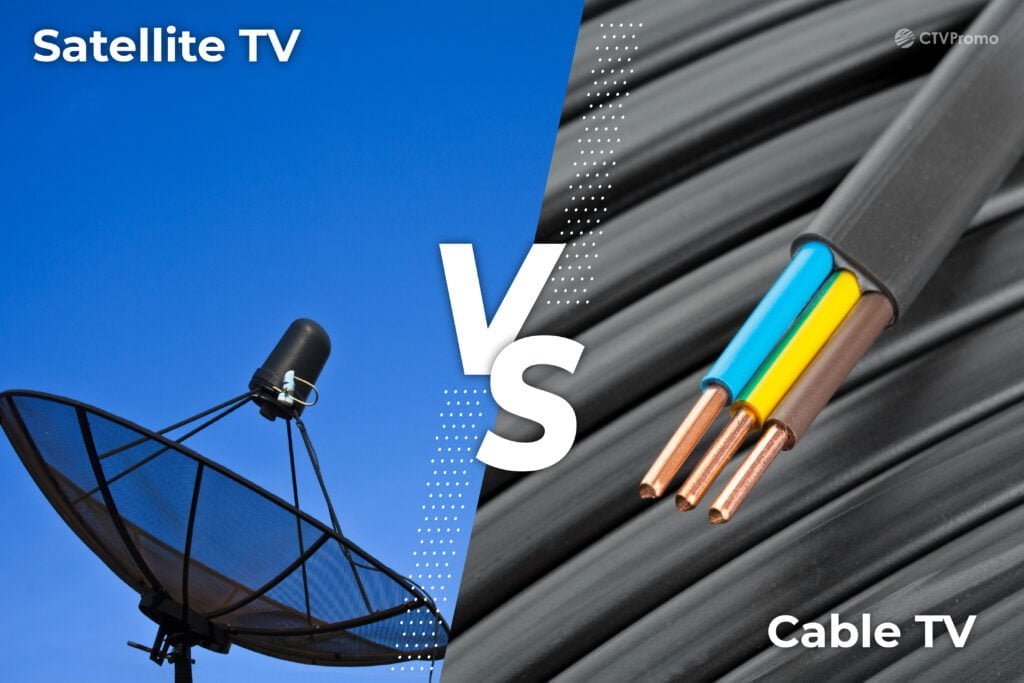On This Page
Home » Blog » Comparing Satellite TV vs. Cable TV: Pros and Cons
Comparing Satellite TV vs. Cable TV: Pros and Cons

Satellite TV and cable TV are two popular options for home entertainment, each with its own set of advantages and drawbacks.
This blog explores the pros and cons of satellite TV and cable TV, providing a comprehensive comparison to help you make an informed decision based on your preferences and needs.
So, let’s get started!
What is a Satellite TV?
Satellite TV utilizes satellite technology to deliver television programming directly to your home. It offers a wide range of channels and is accessible in remote areas. However, it can be affected by weather conditions and may require a satellite dish installation.
Pros of Satellite TV
Satellite TV provides a vast selection of channels, including specialty and international programming. It offers nationwide coverage, making it available in rural and remote areas. Satellite TV also provides access to exclusive sports packages and premium content.
Cons of Satellite TV
Satellite TV signals can be affected by adverse weather conditions such as heavy rain or snow, which may result in temporary signal loss.
Additionally, the installation of a satellite dish may require professional assistance, and the equipment is susceptible to obstructions like trees or buildings.
What is Cable TV?
Cable TV, also known as wired television, utilizes coaxial cables to transmit television signals to your home. It offers a wide range of channels and is known for its reliable signal quality.
However, its availability may be limited to areas with cable infrastructure.
Pros of Cable TV
Cable TV provides a stable and reliable signal, less susceptible to weather-related disruptions. It offers a variety of channels, including local networks, and may include additional features such as video-on-demand and DVR capabilities.
Cable TV is also easier to install as it only requires a cable connection.
Cons of Cable TV
Cable TV availability may be limited to areas with cable infrastructure, making it less accessible in remote locations. It may have fewer channels compared to satellite TV and can be more expensive due to equipment rental fees and additional charges.
| Pros of Cable TV | Cons of Cable TV | Pros of Satellite TV | Cons of Satellite TV | |
| Availability | Accessible in areas with cable infrastructure | Limited availability in remote or rural areas | Nationwide coverage | Susceptible to signal loss during adverse weather conditions |
| Channel | Local channels | Higher base prices | Wide range of channels and specialty programming | Potential for signal disruptions due to weather |
| Selection | Additional features (VOD, DVR) | Equipment rental fees and additional charges | Exclusive content and sports packages | Installation may require professional assistance |
| Signal | Reliable signal quality | Limited accessibility in remote areas | Availability in remote or rural areas | Signal disruptions during adverse weather conditions |
| Reliability | Easy installation | Limited channel options compared to satellite TV | Better picture quality (HD, 4K) | Equipment susceptible to obstructions (trees, buildings) |
| Cost | Competitive pricing options | Additional fees and contract terms | Potential for bundled services | Higher base prices and potential equipment rental fees |
| Flexibility | Suitable for multiple TVs within a household | Limited portability | Portable, suitable for frequent movers | Limited accessibility in areas without a clear line of sight |
| Support | Generally good customer service | Technical support availability may vary | Exclusive deals and promotional offers | Technical support availability may vary |
Let’s compare cable and satellite TV over some other factors to help you choose the right one for your needs.
Cost Comparison of Cable and Satellite TV
Satellite TV and cable TV have different pricing structures.
Satellite TV often offers competitive pricing with various package options, while cable TV may have higher base prices and additional fees for equipment rental and premium channels.
Contract terms and promotional offers should also be considered when comparing costs.
Comparing Channel Selection
Satellite TV typically offers a wider range of channels, including specialty and international programming. It may have exclusive content and sports packages.
Cable TV, on the other hand, often includes local channels and may offer bundled services with internet and phone.
Comparing Signal Reliability
Satellite TV signals can be susceptible to disruptions caused by weather conditions, while cable TV signals are generally more reliable.
Factors such as heavy rain or snowfall may temporarily affect satellite TV reception, while cable TV is less affected by weather-related issues.
Comparing Installation and Equipment
Satellite TV installation typically requires a satellite dish to be mounted outside your home, which may require professional assistance.
Cable TV installation involves connecting a cable line to your TV. Satellite TV equipment is owned by the provider, while cable TV may offer equipment rental options.
Comparing Picture and Sound Quality
Both satellite TV and cable TV offer high-definition (HD) picture quality. Satellite TV also provides the option for 4K Ultra HD resolution, offering superior image clarity.
Sound quality is generally comparable between the two options, depending on the channels and audio equipment used.
Comparing Internet and Bundling Options
Cable TV providers often offer bundled packages that include internet services, allowing for convenient access to both services through a single provider.
Satellite TV providers may have partnerships with internet service providers but may require a separate setup for internet connectivity.
Comparing Customer Service and Support
Customer service quality can vary between satellite TV and cable TV providers. It is advisable to research customer reviews and ratings to gauge the level of service and support provided by the respective companies.
Technical support responsiveness and availability are also essential factors to consider.
Comparing Flexibility and Accessibility
Satellite TV offers greater portability, making it suitable for those who frequently move or have vacation homes. It can be accessed in remote areas where cable infrastructure is unavailable.
Cable TV, on the other hand, provides flexibility for multiple TVs within a household without the need for additional installations.
Conclusion
Choosing between satellite TV and cable TV depends on various factors such as your location, channel preferences, budget, and installation requirements.
Satellite TV offers a broader channel selection and nationwide coverage, but it may be affected by weather conditions. Cable TV provides reliable signals, local channels, and bundled services but may have limited availability.
Consider your specific needs and compare the pros and cons to determine the best option for you.

FAQs
Can I get local channels with satellite TV?
Yes, satellite TV providers often offer local channels depending on your location.
Is cable TV more reliable than satellite TV?
Cable TV signals are generally more reliable, with fewer disruptions caused by weather conditions.
Can I switch between satellite and cable TV easily?
Switching between satellite and cable TV may require new equipment and installation, depending on your chosen provider.
Do satellite TV and cable TV require separate dishes or cable installations?
Satellite TV requires a satellite dish installation, while cable TV utilizes existing cable infrastructure.
Can I bundle internet services with satellite TV?
Some satellite TV providers offer partnerships with internet service providers, allowing for bundled packages. However, separate installations may be required.
People also read
-
 Understanding Different Internet Speeds and Choosing the Right Plan for Your NeedsJune 15, 2023/0 Comments
Understanding Different Internet Speeds and Choosing the Right Plan for Your NeedsJune 15, 2023/0 Comments -

-

-
 Exploring the Benefits of Unlimited Data PlansJune 22, 2023/
Exploring the Benefits of Unlimited Data PlansJune 22, 2023/ -

-

-

-

-

Keep Reading
With CTVPromo, unleash the power of networking! Improve your entertainment experience with top-notch phone, TV, and internet offerings. Here is where your doorway to uninterrupted streaming and never-ending communication opens. Join us right away to explore a world filled with limitless opportunities!
Company
Providers














